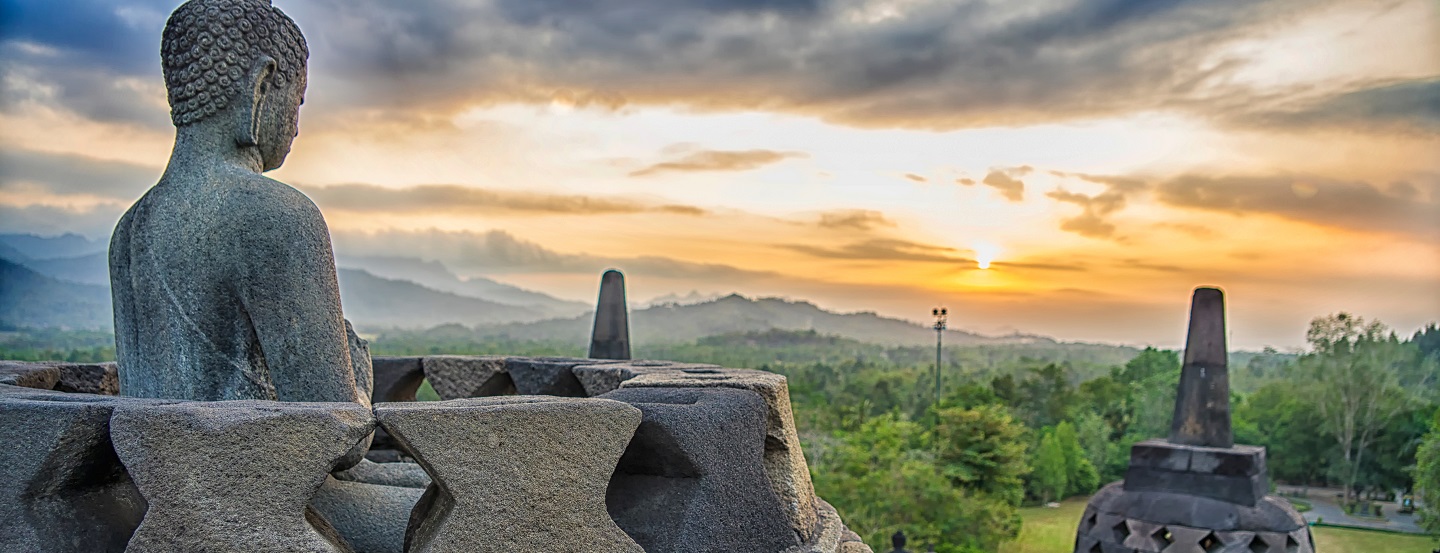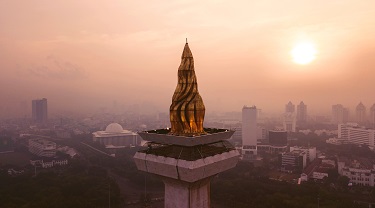
Indonesia: A nation of contrasts
An emerging economy with a diverse culture and array of traditions, the Indonesian market is worth exploring for Canadian businesses. As a country risk analyst for Export Development Canada, I embarked on a recent market research mission to Singapore, Indonesia and Japan to identify the opportunities and political risks in these markets for aspiring Canadian exporters. Here’s my second blog in a three-part series.
Leaving Jakarta’s tidy and well-appointed international airport, I sit back and relax, gazing out of the large glass window of a shiny new train. I watch the changing scenery unfold as we zoom past shanty towns located along the tracks before arriving at the Indonesian capital’s financial district with its gleaming skyscrapers and imposing modern shopping centres. Vibrant and diverse, Indonesia is indeed a country of stark contrasts.
Hardly befitting the “diamond in the rough” label that I had mentally attached to Indonesia, navigating the efficient Bombardier-manufactured airport express train to central Jakarta, just 20 kilometres away, was straightforward and more comfortable than many public transit rides that I have taken from North American airports. Upon arriving at the downtown station, I used an app to hail a taxi to get to my first meeting in Jakarta, a mere 15 minutes’ drive away.
Unfortunately, my initial pleasant commute came to a screeching halt after getting stuck in gridlock traffic for the next hour. My meeting hosts at an international credit rating agency flashed knowing smiles when I finally arrived. “I use ojeks (motorbike taxis) to get to work,” said an analyst.
During our discussion, we touched upon the financial health of Indonesia’s many state-owned enterprises, some of which have taken on high levels of debt from state-owned banks to cover spiralling costs related to a government-led building spree. With government-commissioned construction projects sometimes facing delays, some of these companies have had to borrow to cover the cost of labour and equipment that they mobilized ahead of getting paid.
Stepping out of the bank tower following my visit, I couldn’t help but notice motorcyclists, who were decked out in gear with the green logo for “Gojek,” an online ridesharing service, whizzing by with passengers. Although intrigued, I decided to forgo the two-wheeled experience and hailed a taxi using a Singaporean app known as “Grab,” which has come to dominate the ridesharing market in several Southeast Asian countries.
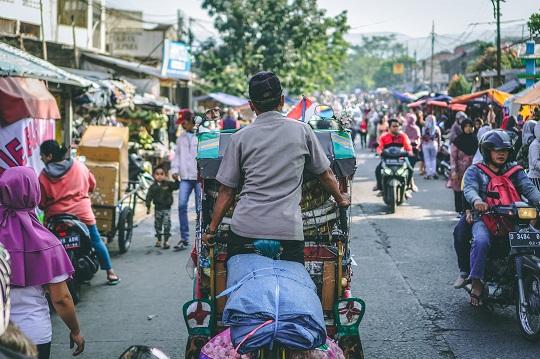
An hour later, I finally arrived at my hotel located on one of central Jakarta’s main thoroughfares, a street lined with contemporary shopping malls, office towers, colourful roadside markets and street vendors selling goods and services, fresh fish and chicken satays.
Throughout my visit, I marvelled at the intriguing juxtaposition of the past and the present visible in the mix of Javanese Dutch colonial and ultra-modern architecture present in different parts of the city. While no one likes traffic jams, there’s much to admire about Jakarta’s transportation network, including the ingenuity of the TransJakarta bus rapid transit system with its elevated platforms and impressive new fleet. What made the experience especially enjoyable were, as is so often the case, my positive encounters with Jakartans who were friendly and helpful.
Before you go
Having experienced this small slice of Indonesia, if you’re contemplating doing business here you need to do your research before tapping into the potential of this massive market. Here are a few things to consider:
- Do your homework. Like many emerging markets, this is a complex country and is still under construction. Just as visiting the worksite of a major industrial project can be both impressive and intimidating, visitors to Indonesia will find themselves awed by the country’s pace of development, but also concerned by the hazards they may see in the political, economic and business environment.
- Connect with Canadian and local partners. Making inroads into new, growing economies is necessary for maintaining Canada’s prosperity, but the environment in some of these markets can contain unknown barriers, including language and cultural differences.
- Canada’s Trade Commissioner Service (TCS) in Jakarta has specialists who can help you navigate Indonesia’s service and industrial sectors and to identify areas of opportunities.
- To contact an export advisor at Export Development Canada, please refer to our Export Help Hub. To explore the potential of growing your business, connect with our market-entry advisors before exporting to Indonesia.
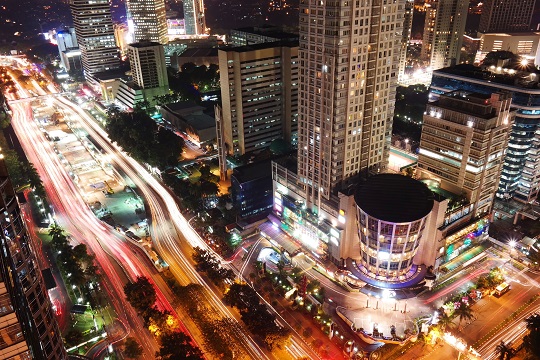
Indonesia’s economic outlook
As the world’s third-largest democracy and fourth-most populous country, Indonesia has maintained a strong relationship with Canada since the establishment of formal diplomatic ties in 1952. In 2018, our merchandise exports were valued at $2.14 billion and total bilateral trade in 2018 was $3.9 billion. Indonesia is the second-largest destination for Canadian direct investment in Southeast Asia, at a total stock of $3.2 billion in 2018.
On the economic front, Indonesia’s main shortcoming is that its growth has been persistently below its potential. Infrastructure and logistics gaps, a tough business climate and sub-optimal health and educational outcomes are frequently cited as some of the structural factors preventing Indonesia’s economy from growing at a faster pace. In 2019 and 2020, these long-standing constraints will be compounded by weaker Chinese demand for Indonesian intermediary goods and commodities, weighing on the performance of Indonesian exports. Indonesian businesses also appear to be investing less due to the uncertain trade environment.
Notwithstanding these short-term challenges and structural constraints, Indonesia remains an economy with significant opportunities due to demographic reasons. The policy priorities of President Joko Widodo (“Jokowi”), who was re-elected for a second five-year term in May 2019, include continued investment in physical infrastructure, such as public transport, airports and utilities, and human capital, specifically education. With a young population of more than 260 million people and a sizable middle class that has grown to about a quarter of the population from only 5% in 2001, Indonesia represents a market where there’s an upside for Canadian goods and services exports.
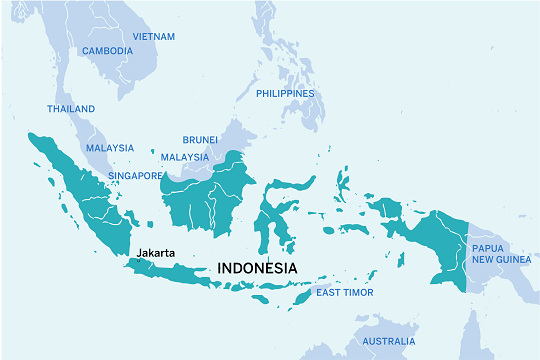
Top Canadian opportunities in Indonesia
Indonesia is our largest export market in Southeast Asia, a geographic region that includes 11 other countries, among them the high-income city-state of Singapore and emerging markets such as Malaysia, Thailand, the Philippines and Vietnam. There are several areas of opportunities for Canadian businesses, among them:
- the agri-food sector as peas, soybean, wheat and a variety of bird seeds are already being exported from Canada to Indonesia in significant quantities with room for more growth.
- Indonesia’s beef market remains tricky for Canadian exporters for various reasons, including a Halal certification requirement process that’s in transition and price-sensitive local consumers. However, there’s a large market for meat bone meal in Indonesia’s poultry industry, which uses the product for chicken feed.
- the education sectors, where the shortcomings of the public system may also present opportunities for Canadian goods and service providers. Vocational and corporate training services are one example of a potential area of growth for Canadian enterprises.
- the infrastructure and energy sector, specialized engineering services, clean technologies and renewable energy-related goods and services. These areas should be in high demand as Indonesia continues to expand its roads, public transit networks, airports and utilities. In these fields, Canadian small- and medium-sized enterprises (SMEs) providing niche solutions could potentially find opportunities and are encouraged to seek out the advice of the TCS as part of their market entry research.
- the digital services sector, which is currently in full bloom. Ridesharing and mobile payment platforms adapted to the local market are omnipresent in Jakarta and are used to deliver food, medicine or any other household good as well as for ordering personal services. Given its popularity, Canadian companies offering digital services relevant to businesses active in e-commerce would do well to explore opportunities in Indonesia.
Challenges facing canadian businesses
Although Indonesia has taken great strides to facilitate more private sector activity, the country’s business environment remains the greatest constraint for Canadian companies seeking to thrive there. Some of the reasons include:
- the weak state of the rule of law. Many international businesspeople are concerned that Indonesia’s law enforcement agencies and the judiciary are subject to being influenced by powerful local interests, and that this would make it hard to get a fair hearing in a dispute with an Indonesian business partner. Even in the best of cases, where no outside influence is exercised, the judiciary may not always have the expertise to render credible verdicts in complex commercial disputes.
- making sense of often contradictory regulations and navigating overlapping authorities is another concern cited by international businesses active in Indonesia. This is especially so if a company must obtain land-use permits as part of a project.
- a longstanding tradition of bribery. While the Indonesian government is taking measures to combat corruption, it might be tempting to engage in bribery in order to resolve roadblocks or expedite processes. However, companies who do so are contravening Canadian and Indonesian law and may be subject to prosecution.
Basic conditions that companies must have in place to address these challenges when entering the market include:
- having the financial depth to make multiple trips to Indonesia, as well as the time and patience to develop strong relationships with local business partners.
- being able to assemble a team of local technical experts for legal, accounting and other operational questions.
Indonesia’s political scene
Indonesia’s tumultuous political landscape is another variable that Canadian companies need to be aware of. The waves of student-led protests that Indonesia saw in fall 2019 were a timely reminder of this fact. Triggered by the passage of a law that weakened Indonesia’s highly credible Corruption Eradication Commission as well as other unpopular legislation, some of these protests by disillusioned youth are believed to have been the largest in Indonesia since the 1998 demonstrations, which brought down military leader Suharto, who ruled as president with an iron fist for 31 years.
Many Indonesians had high hopes for President Jokowi as a new breed of leader who rose from local to national politics on the basis of his ability to improve services and infrastructure rather than political deal-making. During his first term, which began in 2014, Jokowi’s administration managed to improve Indonesia’s ranking in the Ease of Doing Business index, from 120 in 2014 to 73 in 2018. Infrastructure also saw significant investments made possible by increased funds freed up by reduced government energy subsidies in Jokowi’s first term.
However, reform slowed considerably in the last two years of the president’s first term. One of the reasons for this was that Jokowi faced a militant opposition led by longtime rival candidate for president, former general Prabowo Subianto. Using inflammatory rhetoric and an alliance with more hardline Islamist politicians, Prabowo undermined Jokowi and his allies by casting them as “bad Muslims” with more radical groups questioning Jokowi’s faith and ethnic origins. The constant attacks likely forced Jokowi to be more cautious about potentially controversial economic reforms that could chip away at his popularity.
Nevertheless, Jokowi ultimately prevailed, and the confirmation of his victory sparked rare violent clashes in Jakarta between opponents and the police. However, subsequently, Jokowi and Prabowo reconciled publicly and the latter distanced himself from violence by hardliners opposed to Jokowi. Then, in October 2019, Jokowi unveiled his cabinet, which included the controversial Prabowo as minister of defence.
Observers have mixed views on what this political reconciliation might mean for Indonesia’s economic prospects. Some believe that the move will negatively impact reforms as Jokowi’s new allies will have their own political agendas. Others contend that the government could now be more willing to advance sensitive economic policies, which would unlock growth and make Indonesia a more attractive investment destination. Examples of reform policies that are often recommended would be reducing corporate taxes, making it easier for private and public sector employers to lay off permanent employees on performance-based grounds, and reducing caps on foreign ownership that still exist in several industries.
Even if the government and parliament become more focused on reform, labour unions will still oppose employment law changes and Indonesia’s business elites could oppose attempts to open up new sectors to foreign entrants. Reform is likely to be incremental and modest at best over the next five years. This doesn’t signify that Indonesia shouldn’t be on the radar of Canadian companies. It just means that doing business in the country could continue to be more time-consuming and expensive in the short-term than in more mature economies, making it necessary to weigh the costs and benefits of being in a market as large as Indonesia compared to smaller countries in the region.
Check out John Bitzan’s initial blog in this series entitled, Navigating the opportunities and challenges in Southeast Asia.













